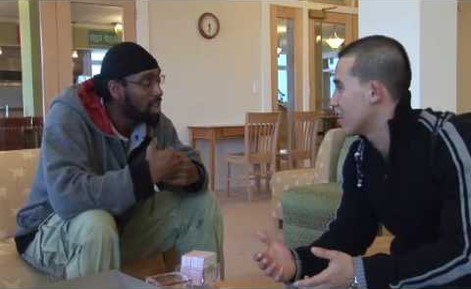Peer Support is where people who have “lived experience” with mental health and/or substance use challenges or other life challenges are able to “walk beside” people on their path of recovery, and help them in a helpful way.
Peer Support is when people who have similar lived experiences intentionally come together in a mutually supportive relationship based on empathy and trust, to support and give each other encouragement, hope, assistance, guidance, and understanding that aids in recovery and brings about a desired social or personal change. Peers walk beside each other and assist each other in learning and utilizing new perspectives and new tools, as well as enhancing current tools, to deal with challenging situations. Peer Support helps someone develop or restore a positive and meaningful identity and quality of life, despite their situation, diagnosis, symptoms, condition, history, or presumed limitations.
Peer Support is different from therapy and other health care treatments because of the vital importance of people’s “lived experiences.” Peer Supporters use their personal recovery to help others, by encouraging people to learn and practice self- determination, personal responsibility, and empowerment.
Peer support is frequent, ongoing, accessible, and flexible, and can take many forms, including phone calls, text messaging, group meetings (in person or online), home visits, going for walks together, as well as other forms. It complements and enhances other health care services by creating the emotional, social, and practical assistance necessary for managing life situations and staying well.
Our philosophy of Peer Support includes getting to know the people we support and connecting with them on a personal level, helping them navigate life’s challenges, supporting them through their struggles, and walking with them along their journey of wellness.
Check out our FAQs below to learn more about Peer Support and how you can participate!






Click the following links to learn more about Group Peer Support sessions, Individual Peer Support sessions, or find out more about how to become a Peer Support Specialist (*Insert LINK to TYHW Class*).
Peer Support FAQs
There are so many more benefits of Peer Support. In fact, the benefits are almost endless. For more information and to download a more extensive list of the benefits of Peer Support, (*Click Here*). (*link to PDF Sheet listing all Benefits of Peer Support*) Here are some of the many benefits of Peer Support:
- Development & Improvement of Appropriate Coping Skills/Wellness Tools
- Enhanced Self Concept, Self Esteem & Self Confidence
- Reduced Stigma
- Decreased Anxiety & Depression
- Reduced Use of Substances & Relapse Prevention
- Development & Improvement of Effective Communication Skills
- Increased Self-Determination, Decision Making & Problem Solving Skills
- Improvement of Physical & Mental Health
- and More…
“Stuff” happens in life, and anyone who is dealing with whatever life throws at them can benefit from receiving Peer Support.
The person receiving Peer Support services, his or her family, friends, coworkers, and others can all benefit from Peer Support.
People with the following challenges have benefited from participating in Peer Support programs:
- Anger Management
- Bipolar Disorder
- Depression
- Anxiety
- Stress Management
- Schizoaffective Disorder
- Strokes
- Cancer
- Spinal Cord Injuries (SCI)
- Traumatic Brain Injuries (TBI)
- Youth At Risk
- Substance Use and Abuse
- Other Mental Health issues
- Other Physical Illnesses
- Many Other Challenges
- Family Members of People with these and other Challenges
For additional information, to volunteer, donate, or schedule a session, email Creekside Recreational Therapy & Wellness or call 252-349-0220. Sessions can generally be scheduled within 10 business days.
It’s easy – just click here (*LINK* to form “I need Peer Support”*) to let us know what services you are interested in and what you would like to gain from participating in Peer Support services. We will contact you soon and we look forward to being able to serve you.
A Peer Support Specialist (PSS) walks alongside someone who is going through “the stuff” that life throws at them. They listen, provide mutual support, encourage, disclose their story with hope, advocate, educate, empower the people they support. A Peer Support Specialist is a role model that works to reduce and eliminate stigma, and is a living example that recovery is possible.
A Peer Support Specialist (PSS) serves as a partner and a guide to the person they are supporting. A PSS is recovery and wellness oriented, and realizes that there are many different paths along the journey of recovery and wellness. A PSS uses his or her own lived experiences and training to help the person they are supporting to discover the best path of recovery. This path will be different for every person, and it is the Peer Support Specialist helps the person they are supporting to find the path that works best for them.
A Peer Support Specialist may use several things to help them support someone. They may even teach the person they are supporting how to do some of these things, including:
- Wellness Recovery Action Plans (WRAP)
- Mindfulness
- Meditation
- Deep breathing and other relaxation techniques
- Wellness Tools (or coping skills)
- Effective Communication Skills
- Assertiveness
- Goal Setting
- Anger Management and Conflict Resolution Skills
- Recovery Language
- Accessing Community Resources
- Healing from the Effects of Trauma
- Self Advocacy
- Wellness Education
There are many more things that Peer Support Specialists use when they support the people they work with.
If you feel like you would benefit from Peer Support Services, please click here (*Insert LINK for I need Peer Support form*). If you would like to learn more about how to become a Certified Peer Support Specialist, please click here (*Insert TYHW Signup info here*).
Peer Support can be practiced in clinical (hospital, outpatient clinic, inpatient rehabilitation treatment program,doctor’s office), residential (group home, foster home, family home), and community (peer support center, school, after school program, camp, recreation and parks program, etc.) settings.
Peer Support Specialists are people who have dealt the “stuff” that life throws at them – specifically with mental health and/or substance use challenges (this is called “lived experience”) – and who have learned how to work through that “stuff” and come out better and brighter on the other side. Peer Support Specialists are living in recovery (for at least one year) and have been trained how to share their story in a helpful way in order to provide encouragement, support, and shine the light of hope for others.
Peer Support Specialists are people who self-identify as having personal experience with psychiatric and/or addiction struggles and who are in recovery, who are living examples that recovery is possible, who model recovery in their lives, and who have successfully completed a state approved training program, and who have become certified in the state of North Carolina (see more information about that below). People with similar challenges are able to share knowledge and experiences – including some that many health care workers do not have.
In North Carolina, all Peer Support Specialists are required to complete a training program that has been approved by the North Carolina Certified Peer Support Specialist Program. For more information about the Peer Support Specialist certification process, visit this site. To learn more about becoming a Certified Peer Support Specialist, or to register for an upcoming training, (click here). (*Insert LINK to learn more about becoming a CPSS & TYHW*)
In North Carolina, all Peer Support Specialists need to self identify with have life experience with mental health and/or substance use/abuse challenges, be in recovery related to those challenges for at least one year, be at least 18 years old, have at least a GED, and are required to complete a training program that has been approved by the North Carolina Certified Peer Support Specialist Program. For more information about the Peer Support Specialist certification process, visit this site. The Take Your Heart to Work® course is an approved training course that will prepare you to become a Peer Support Specialist. You can learn more about the Take Your Heart to Work® course and register for the next class here. After you have met the requirements listed above, you also need to submit the completed application form (along with 2 reference forms), and pay the certification fee.

